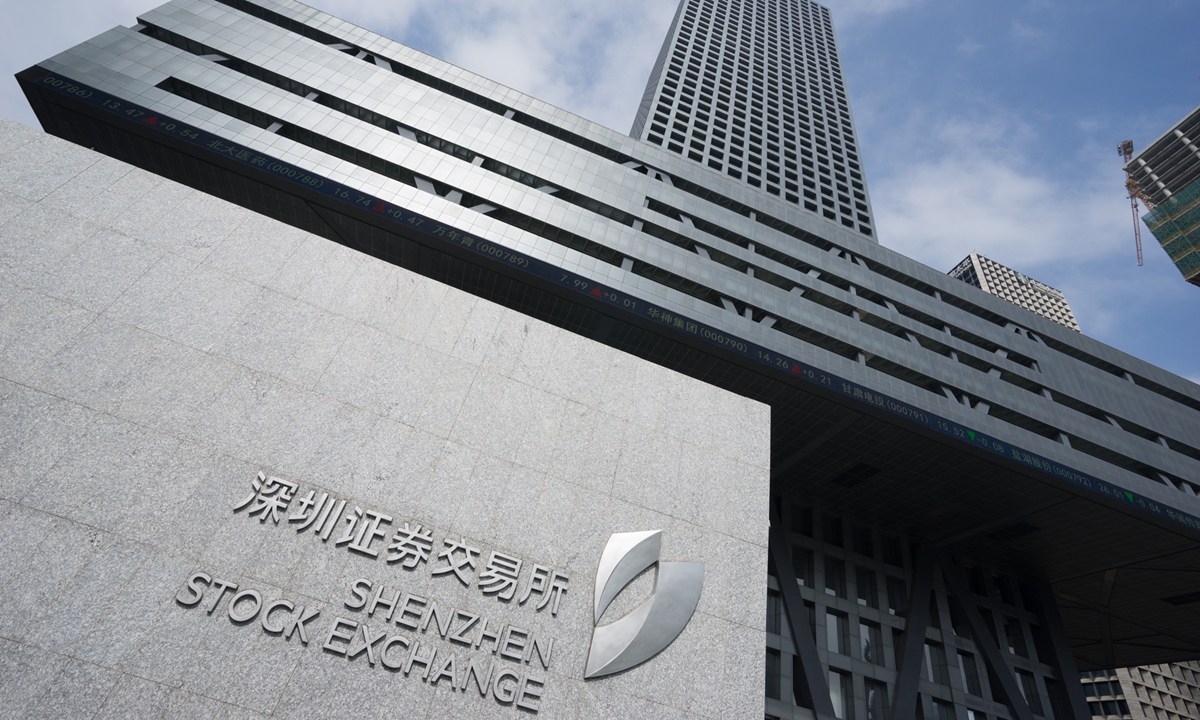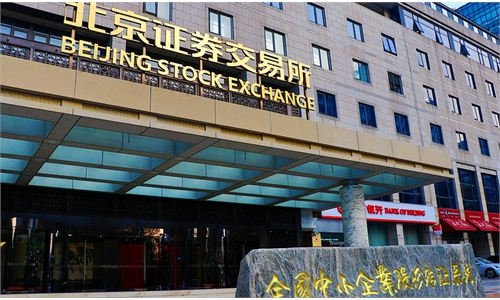China's official remarks, policies aim to revive economy, instill optimism
Chinese equities nosedive amid surge in epidemic

Shenzhen Stock Exchange Photo:VCG
As China's equity and foreign exchange markets undergo big swings amid multifaceted uncertainties, a flood of official remarks, policy recommendations and actions have been made or taken, as part of the government's bid to instill optimism for the world's second-largest economy and the capital market.
The announcements spanning investment, consumption, and monetary policies are supposed to create a buffer against downward pressures on the economy, market observers said.
The country still has leeway to restore investor confidence, they noted, expecting more moves in the pipeline to steady the yuan, which alongside the progress on virus containment in some of the nation's largest cities would be key to driving a market turnaround.
A meeting of the Central Committee for Financial and Economic Affairs on Tuesday called for market expectations to be well guided and policy orientations and principles to be clarified, so as to stabilize market confidence.
In a major sign of policy support, Chinese President Xi Jinping on Tuesday chaired the meeting, stressing efforts to strengthen China's infrastructure development and build infrastructure facilities that are conducive to China's industrial development and national security.
Shortly prior to the market opening on Tuesday, the People's Bank of China (PBC), the central bank, posted a short statement on its website, reassuring the market of the economy's sound fundamentals, the huge potential of the economy's organic growth.
"We've taken note of some fluctuations in the financial market recently, mainly affected by investors' expectations and sentiment," read the note.
The Shanghai Composite Index plunged 5.13 percent on Monday before shedding another 1.44 percent on Tuesday. The benchmark finished below 2,900 points on Tuesday after failing to hold above the key support level of 3,000 points.
Not long after Tuesday's market close, the Shanghai Securities Association, the Shanghai Futures Association, and the Shanghai Asset Management Association jointly released a notice that called on market participants to steadfastly maintain market stability.
The financial system has endorsed a two-pronged push for virus containment and economic development, with support for smooth logistics and industrial and supply chain stability to minimize the impact of the epidemic on the economy and society, the PBC said.
The central bank vowed to ramp up monetary policy support for the real economy, with the rollout of relending tailored for innovations and social welfare, as well as an additional 100 billion yuan ($15.28 billion) of relending for coal exploration and new energy.
The PBC's fresh remarks came on the heels of its announcement on Monday to cut forex reserve requirements for financial institutions by 1 percentage points to 8 percent amid the yuan's accelerated depreciation.
The first-of-its-kind cut, effective on May 15, followed five previous hikes when the yuan was under pressure to appreciate, media reports said.
A universal 25 basis points reductions in banks' reserve requirements, expected to release about 530 billion yuan in long-term capital, also took effect on Monday.
The State Council, the cabinet, joined the busy Monday policymaking spree with the unveiling of guidelines on further unleashing consumption power and fostering a continued recovery of consumption.
Chinese mainland shares saw signs of stabilizing after Monday's slump, underpinned by consumer shares that gained on the release of the guidelines, Yang Delong, chief economist at Shenzhen-based First Seafront Fund Management Co, told the Global Times on Tuesday.
Also on Monday, the National Development and Reform Commission, the country's top economic planner, issued a statement that pledged to "actively expand effective investment and boost the economy's stable and healthy development."
Economists say that the country has sufficient policy tools to restore investor confidence, anticipating more policies to curb yuan weakness and reignite market sentiment.
"While uncertainties remain for China, there are signs of constructive policy developments and financing conditions becoming more favorable, which should make for a better environment," London-based Salman Ahmed, global head of Macro and Strategic Asset Allocation at Fidelity International, said in a note sent to the Global Times on Tuesday.
The Chinese economy is apparently facing hardships in meeting the annual GDP growth target of around 5.5 percent, Lian Ping, head of Zhixin Investment Research Institute in Shanghai, told the Global Times on Tuesday.
The economy recorded an expansion of 4.8 percent in the first quarter.
Economic growth is likely to trend lower in the second quarter, Lian said, citing epidemic containment efforts, especially in the financial hub of Shanghai.
The country would be more tolerant of the economy's real growth, which Lian put at about 5 percent for the whole of 2022, he said.
Containment measures adopted in Chinese cities have had a negative impact on production and life, which is likely to happen in any country, Foreign Ministry spokesperson Wang Wenbin told reporters on Monday.
The vast majority of Chinese people understand and support the government's virus-fighting policies and measures, Wang said, noting that China won't lay idle facing Omicron variant. "We're destined to win and will make a greater contribution to the world," the spokesperson said.
The epidemic in Shanghai has shown signs of easing. Beijing, for its part, has moved swiftly to fight a new surge, with the capital city's health authorities announcing late on Monday plans to launch mass nucleic acid testing for about 90 percent of the city's population on Tuesday.
The stock market that has over the years become increasingly market-oriented is sensitive to yuan moves, Lian said, especially when the Chinese currency weakens against the US dollar.
A weaker yuan indicates the weakness of yuan-denominated assets, he explained, noting that a turnaround in yuan moves could put mainland shares back on a recovery track.
The announcement of Monday's forex reserve requirement cut almost immediately sent the dollar-yuan exchange rate down to 6.57, Nomura economists led by Lu Ting said in a research report sent to the Global Times on Tuesday.
The Nomura economists forecast the central bank to cut reserve requirements on forex deposits by another 1 percentage point to 7 percent before the end of the year.



